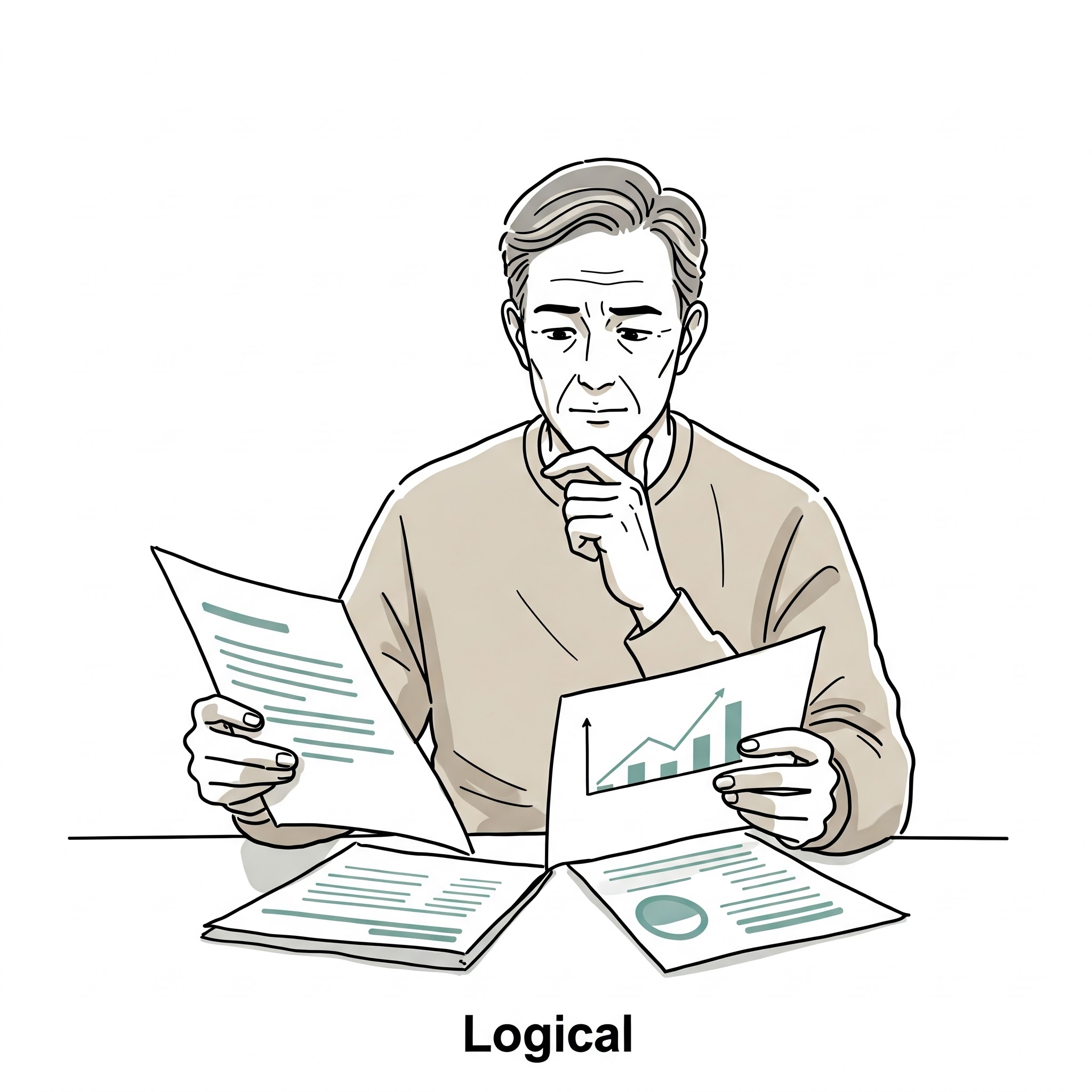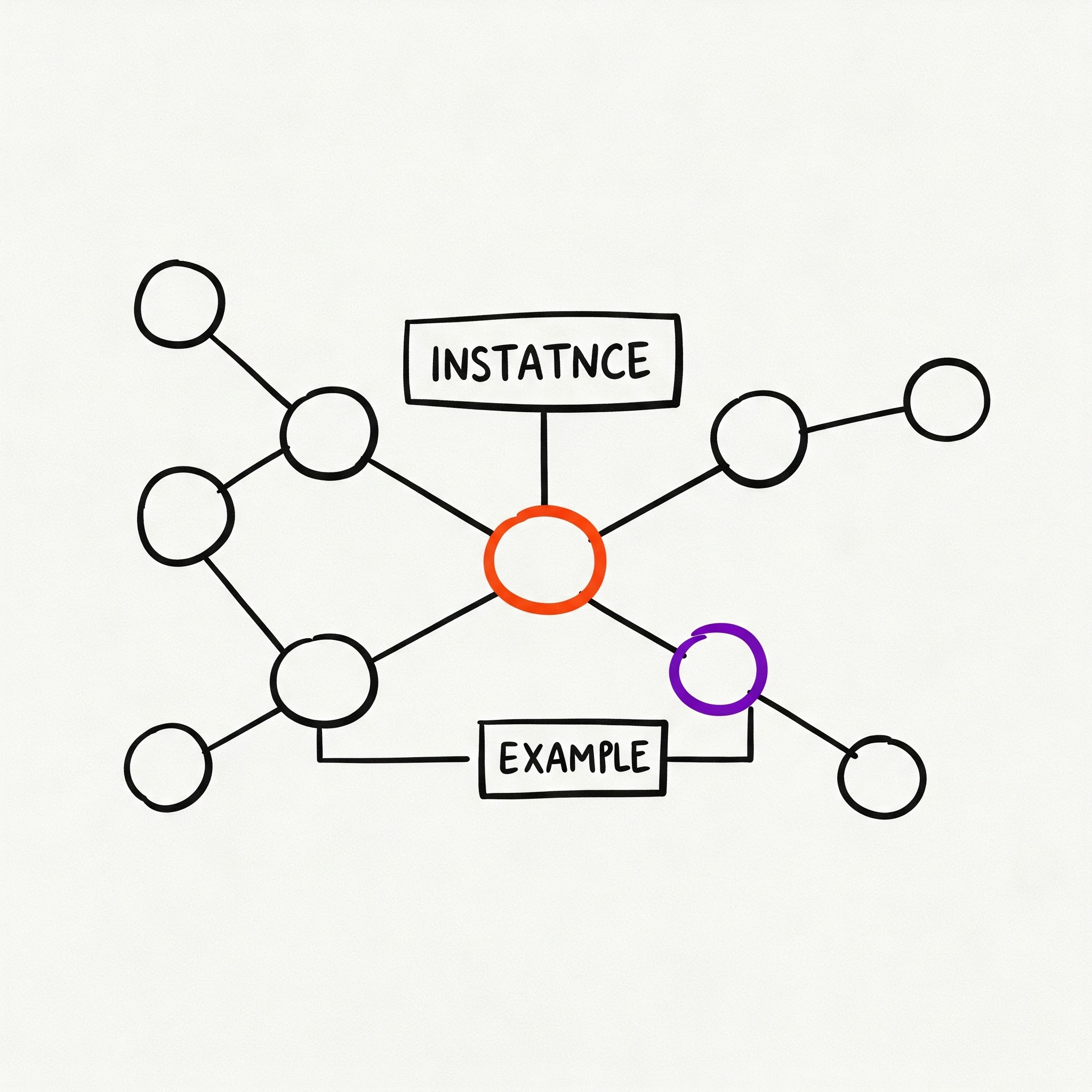Logical
Definition
Logical is an adjective that refers to reasoning or thinking that is clear, sound, and consistent with the principles of logic. It describes actions, decisions, or arguments that are rational and based on valid reasoning.
Parts of Speech
- Adjective
Pronunciation
American English
- IPA Pronunciation: /ˈlɑːdʒɪkəl/
- Respelling: LAH-ji-kuhl
British English
- IPA Pronunciation: /ˈlɒdʒɪkəl/
- Respelling: LODG-i-kuhl
Etymology
The word "logical" originates from the Late Latin "logicus," meaning "pertaining to reasoning or logic," and the Greek "logikos," derived from "logos," meaning "word," "reason," or "thought."
Derivatives
- Logically (adverb)
- Logician (noun)
- Logic (noun)
- Illogical (adjective)
- Logicality (noun)
Synonyms
- Rational
- Reasonable
- Coherent
Antonyms
- Illogical
- Unreasonable
- Incoherent
Usage
The term "logical" is widely used in contexts involving problem-solving, arguments, and decision-making. For example, "Her argument was logical and well-structured," or "It's logical to assume that demand will increase."
Related Terms
- Reason: The power of the mind to think and form judgments.
- Deduction: The process of reasoning from general principles to specific instances.
- Analysis: Detailed examination of elements or structure.
Detailed Definitions
Adjective
- Relating to clear and sound reasoning: Refers to ideas or arguments that follow the principles of logic.
- Example: "His explanation was perfectly logical."
- Capable of reasoning or thinking clearly: Describes a person or their mental processes.
- Example: "A logical person would never ignore these facts."
- Expected or natural given the circumstances: Refers to decisions or actions that make sense within a particular context.
- Example: "It was the logical next step in her career."
logical



🇨🇳 Mandarin
- 逻辑的 (luóji de) - in accordance with logic
- IPA Pronunciation: /lwɔ˧˥t͡ɕi˥˩ tɤ˥˩/
- Respelling in English: lwo-jee duh
- 合理的 (hélǐ de) - reasonable or natural under circumstances
- IPA Pronunciation: /xɤ˧˥li˧˥ tɤ˥˩/
- Respelling in English: he-lee duh
🇮🇳 Hindi
- तार्किक (tārkik) - in accordance with logic
- IPA Pronunciation: /t̪aːrkik/
- Respelling in English: taar-kik
- सहज (sahaj) - reasonable or natural under circumstances
- IPA Pronunciation: /səɦəd͡ʒ/
- Respelling in English: sa-haj
🇪🇸 Spanish
- Lógico (lógico) - in accordance with logic
- IPA Pronunciation: /ˈlo.xi.ko/
- Respelling in English: lo-hee-ko
- Natural (natural) - reasonable or natural under circumstances
- IPA Pronunciation: /na.tuˈɾal/
- Respelling in English: na-tu-ral
🇫🇷 French
- Logique (logique) - in accordance with logic
- IPA Pronunciation: /lɔ.ʒik/
- Respelling in English: lo-zheek
- Raisonnable (raisonnable) - reasonable or natural under circumstances
- IPA Pronunciation: /ʁɛ.zɔ.nabl/
- Respelling in English: re-zo-nabl
🇸🇦 Modern Standard Arabic
- منطقي (manṭiqī) - in accordance with logic
- IPA Pronunciation: /man.tˤi.qiː/
- Respelling in English: man-ti-qi
- طبيعي (ṭabi'i) - reasonable or natural under circumstances
- IPA Pronunciation: /tʕa.bɪː.ʕi/
- Respelling in English: ta-bee-i
🇧🇩 Bengali
- যৌক্তিক (yaʊktik) - in accordance with logic
- IPA Pronunciation: /jɔukt̪ik/
- Respelling in English: jowk-tik
- যথাযথ (yathāyatha) - reasonable or natural under circumstances
- IPA Pronunciation: /jɔtʰajɔtʰ/
- Respelling in English: jo-tha-jo-tha
🇷🇺 Russian
- Логический (logicheskiy) - in accordance with logic
- IPA Pronunciation: /ləɡʲɪˈtɕɛskʲɪj/
- Respelling in English: lo-gi-ches-kiy
- Разумный (razumnyy) - reasonable or natural under circumstances
- IPA Pronunciation: /rɐˈzumnɨj/
- Respelling in English: ra-zum-ny
🇵🇹 Portuguese
- Lógico (lógico) - in accordance with logic
- IPA Pronunciation: /ˈlo.ʒi.ku/
- Respelling in English: lo-zhee-koo
- Natural (natural) - reasonable or natural under circumstances
- IPA Pronunciation: /nɐ.tuˈɾal/
- Respelling in English: na-too-rahl
🇮🇩 Indonesian
- Logis (logis) - in accordance with logic
- IPA Pronunciation: /loɡis/
- Respelling in English: lo-gis
- Alami (alami) - reasonable or natural under circumstances
- IPA Pronunciation: /alami/
- Respelling in English: a-la-mi
🇩🇪 German
- Logisch (logisch) - in accordance with logic
- IPA Pronunciation: /ˈloːɡɪʃ/
- Respelling in English: loh-gish
- Natürlich (natürlich) - reasonable or natural under circumstances
- IPA Pronunciation: /naːˈtʏʁlɪç/
- Respelling in English: na-tur-lich
🇯🇵 Japanese
- 論理的な (ronriteki na) - in accordance with logic
- IPA Pronunciation: /ɾoɴɾitekina/
- Respelling in English: ron-ri-te-ki-na
- 自然な (shizen na) - reasonable or natural under circumstances
- IPA Pronunciation: /ɕizenna/
- Respelling in English: shi-zen-na
🇻🇳 Vietnamese
- Hợp lý (hợp lý) - in accordance with logic
- IPA Pronunciation: /həp li˧ˀ˨ʔ/
- Respelling in English: hop lee
- Tự nhiên (tự nhiên) - reasonable or natural under circumstances
- IPA Pronunciation: /tɨj ɲiən˧ˀ˨ʔ/
- Respelling in English: too nien
🇰🇷 Korean
- 논리적인 (nonlijeog-in) - in accordance with logic
- IPA Pronunciation: /nʌn.li.d͡ʑʌ.ɡin/
- Respelling in English: non-li-jeo-gin
- 자연스러운 (jay-eonseureoun) - reasonable or natural under circumstances
- IPA Pronunciation: /t͡ɕa.jʌn.s͈ɯ.ɾʌ.un/
- Respelling in English: ja-yeon-seu-reo-un
🇹🇷 Turkish
- Mantıksal (mantıksal) - in accordance with logic
- IPA Pronunciation: /mantɯksal/
- Respelling in English: man-tik-sal
- Doğal (doğal) - reasonable or natural under circumstances
- IPA Pronunciation: /doːal/
- Respelling in English: do-al
🇵🇰 Urdu
- منطقی (mant̤iqī) - in accordance with logic
- IPA Pronunciation: /mʊn.tɪʔ.qiː/
- Respelling in English: mun-tiqi
- قدرتی (qūdratī) - reasonable or natural under circumstances
- IPA Pronunciation: /qʊ.dɾə.t̪iː/
- Respelling in English: qu-dra-ti




.webp)
